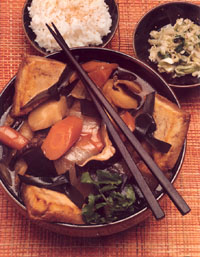|
|
$30
including shipping & handling within the continental
US.
For information about multiple copies for retail sales, please
contact us at 212.473.0305,
ext. #25.
"Since
opening its doors in 1976, Angelica Kitchen has been a haven
for healthy-food loving folks. The Angelica Home Kitchen
brings tantalizing and distinctive flavors home."
- Anna Lappe, Frances Moore Lappe,
authors of Hope's Edge: The Next Diet for a Small
Planet, cofounders of The Small Planet Fund
"The
Angelica Home Kitchen is wonderful! The farmers' biographies
are great as are the recipes, the photos, the text - everything!"
- Joan Dye Gussow, author of This Organic
Life: Confessions of a Suburban Homesteader,
nutrition and health expert
"Leslie
McEachern's cooking philosophy, recipes, and rabble rousings
are nothing short of inspirational."
- Marion Nestle, author of Food Politics,
Professor of Nutrition and Food Studies at New York University
"What's
the secret of Angelica Kitchen's legendary success? Its inclusive
heart. McEachern's worldview permeates this book and informs
one's own heart and hearth. The recipes offer luscious and
healing foods."
- Rebecca Wood, author of The New Whole
Foods Encyclopedia and The Splendid Grain,
winner of both the Julia Child and James Beard Cookbook Awards.
|
|
|
|
| |
The
Angelica Home Kitchen: Recipes and Rabble Rousings from an
Organic Vegan Restaurant
By Leslie McEachern
Recipe Development with Chef Peter Berley
Photography by John
Bigelow Taylor
For over 25 years, New York
City’s
Angelica Kitchen has been widely regarded as the epicenter
of the vegan universe. Located on a cozy, tree-lined street
in the East Village, Angelica Kitchen offers a multitude of
innovative dishes using only the finest organic ingredients
delivered daily from local purveyors. In "The Angelica Home
Kitchen," owner Leslie McEachern shares more than 100
of her favorite
recipes
as well
as a wealth of information on sourcing,
purchasing from, and supporting local organic farmers. Recipes
for familiar favorites such as Sea Caesar Salad, Asian Root
Vegetable Stew, Mocha Cheesecake with Chocolate Brownie Crust,
and the famed Dragon Bowl have been carefully redesigned for
the home cook, making "The Angelica Home Kitchen" a
must-have for creating delightful vegan dishes at home.
|
 |
|
Oden (asian root vegetable stew)
Yield: 4
to 6 servings Cooking Time: 1 hour
A highlight of Japanese country cooking, oden is generally
a five-root stew. Our version adheres to that tradition. This is my favorite
winter stew and it features several fundamental ingredients of Japanese
cuisine - kombu, shoyu, ginger, and rice wine (mirin). If you like, you
can include additional root vegetables such as white turnips, jerusalem
artichokes, celeriac (celery root), and parsley root. And oden is good
for what ails you: It's a blood purifier and fortifier. For authenticity,
cook it in a black iron kettle over a fire in the middle of your hut. |
2
teaspoons olive oil
2 cups diced onions (1 large)
6 cups water
Approximately 6 oz. each of the following 5 ingredients:
1 cup burdock, scrubbed and cut into 1-inch pieces
1 cup carrots, scrubbed and cut into 1-inch pieces
1 cup daikon, scrubbed and cut into 1-inch pieces
1 cup rutabagas, scrubbed and cut into 1-inch pieces
1 cup parsnips, scrubbed and cut into 1-inch pieces
4 to 6 dry shiitake mushrooms
1 (3-inch) piece dried kombu
5 slices ginger, each the size of a quarter
1/2 cup shoyu or tamari
2 tablespoons mirin
1/4 cup kuzu
1 tablespoon toasted sesame oil
2 tablespoons sliced scallions for garnish
In a heavy 3-quart saucepan, sauté the onions and burdock in the olive oil over medium heat for 10 minutes.
Add 6 cups of water and bring to a boil over high heat. Add
the carrots, daikon, rutabagas, parsnips, shiitake mushrooms,
kombu, ginger, mirin, and tamari.
Lower the flame and simmer covered for 30 to 40 minutes or until
the vegetables are tender. Remove the ginger and discard.
Remove the kombu and shiitake mushrooms, slice into bite-size pieces, and return to the pot.
Dissolve the kuzu in 1/4 cup cold water; stir into the stew and simmer for 1 or 2 minutes longer.
Stir in the sesame oil.
NOTE: You should never cook with toasted sesame oil because
high heat will release free radicals in the oil, making it toxic. Use toasted
sesame oil as a last-minute addition; treat it like a flavor enhancer such
as salt or vinegar.
Serve with noodles or rice, accompanied by baked, marinated tofu, kimchee, and scallion garlic.
|
|

